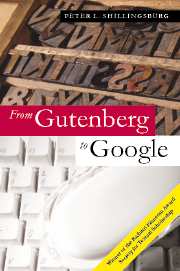Book contents
- Frontmatter
- Contents
- Introduction
- 1 Manuscript, book, and text in the twenty-first century
- 2 Complexity, endurance, accessibility, beauty, sophistication, and scholarship
- 3 Script act theory
- 4 An electronic infrastructure for representing script acts
- 5 Victorian fiction: shapes shaping reading
- 6 The dank cellar of electronic texts
- 7 Negotiating conflicting aims in textual scholarship
- 8 Hagiolatry, cultural engineering, monument building, and other functions of scholarly editing
- 9 The aesthetic object: “the subject of our mirth”
- 10 Ignorance in literary studies
- Bibliography
- Index
2 - Complexity, endurance, accessibility, beauty, sophistication, and scholarship
Published online by Cambridge University Press: 23 December 2009
- Frontmatter
- Contents
- Introduction
- 1 Manuscript, book, and text in the twenty-first century
- 2 Complexity, endurance, accessibility, beauty, sophistication, and scholarship
- 3 Script act theory
- 4 An electronic infrastructure for representing script acts
- 5 Victorian fiction: shapes shaping reading
- 6 The dank cellar of electronic texts
- 7 Negotiating conflicting aims in textual scholarship
- 8 Hagiolatry, cultural engineering, monument building, and other functions of scholarly editing
- 9 The aesthetic object: “the subject of our mirth”
- 10 Ignorance in literary studies
- Bibliography
- Index
Summary
With the sense of the splendour of our experience and of its awful brevity, gathering all we are into one desperate effort to see and touch, we shall hardly have time to make theories about the things we see and touch.
– we have an interval, and then our place knows us no more … our one chance is in expanding that interval, in getting as many pulsations as possible into the given time.
Walter Pater, Studies in the History of the Renaissance (1873)The revolution in textual studies that tumbled down the gods of “definitive texts“ and of “final authorial intentions”; that demoted the tyrants of textual control, of established texts and determinate readings; that scoffed at the idea of a unified field theory of textual studies – this textual revolution has erected in the place of tumbled gods the gods of multiplicity, comprehensiveness, and objectivity in new, attractive (mostly electronic) forms. New gods are always arising to fill the vacuums left by fallen gods.
Where once all textual scholars agreed – Fredson Bowers and James Thorpe told us on several occasions, perhaps more hopefully than accurately – that the goal of textual studies and the aim of scholarly editions was to establish the text of the author's final intentions and that the new scholarly edition, the new edited text, would become the basis for all responsible literary interpretation and criticism; where once there was, or seemed to be, this unified view of the textual scholar's task, there now stands a general agreement that that is NOT the scholars' task.
- Type
- Chapter
- Information
- From Gutenberg to GoogleElectronic Representations of Literary Texts, pp. 25 - 39Publisher: Cambridge University PressPrint publication year: 2006



